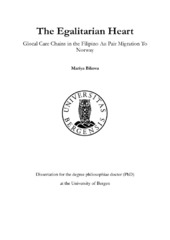| dc.description.abstract | This study explores the phenomenon of Filipino au pair migration to Norway through the lens of the global care chains framework. For the past two decades au pairing has grown alongside other forms of paid domestic labour, also in Norway, where the norms of gender equality and international solidarity have traditionally been strong and the employment of private cleaners and domestic workers is seen as morally problematic. Because of the affinities between au pairs and domestic workers, the global care chains perspective – developed originally in the USA for the study of domestic workers and nannies in private homes – has been extended to the study of au pairs, often without taking into consideration the local institutional contexts to which it is applied. The metaphor of the care chain calls attention to the commodification of reproductive labour and the multiple links that emerge between individuals, households, and societies when tasks such as cleaning, cooking, and caring become commodities sold and bought on a global market. Studies deploying the care chains perspective have often depicted migrant women as victims and servants of globalization. Drawing on ethnographic fieldwork among current and former Filipino au pairs, this study explores how they rationalize and go about au pairing in Norway, and how they experience being au pairs in an egalitarian society with ‘passion for equality’. Unlike other au pair studies, this one brings also the perspectives of the au pairs’ family members to the fore of the analysis in an attempt to understand how the au pair migration to Norway impacts the lives of their families in the country of origin. With a glocalized care chains framework, i.e., a framework sensitive to the particularities of the local contexts of the sending and receiving societies, this study shows that economic motivation is an important reason for migration, but that also the cultural and formative elements of the au pair scheme are important for the au pairs. The analysis shows that the Norwegian au pair scheme offers an attractive way to travel, work, and achieve one’s personal goals to au pairs from different class backgrounds, and that rather than always poor and disadvantaged, Filipino au pairs are agentive and resourceful. Another important finding is that due to the local Norwegian care culture, according to which the best care for children is the pedagogical upbringing in the kindergarten, Filipino au pairs are seldom responsible for the daily care of the host family’s children. The analysis reveals that even though the au pairs might want to engage in the care of the host family’s children, they are not always able to. In this situation, the au pairs are performing mostly the domestic work of the host families. Even though au pairs are hired mostly for the sake of doing the ‘dirty work’ of cleaning, cooking and dusting, the Norwegian host families try not to overwork them and to follow the terms of the employment contract. An important finding, made possible through the glocalization of the care chains analysis, is that the interplay of the Norwegian gender, care and migration regimes create locally-specific conditions for au pairing that not only enable the au pairs to enjoy leisure time, but also make possible new ways of producing emotional surplus value. The study examines also the role of remittances in the everyday lives of the au pairs’ families in the country of origin, and shows that monetary remittances reorganize local care relations by challenging established gender orders and by triggering new care chains. The analysis, however, shows that the practice of remitting is not universal, but class-specific, and that the transnational exchanges of care are complex and multi-directional. The glocalization of the global care chain framework is a major contribution of this study. By exploring the experiences of au pairs from different socio-economic backgrounds, this study challenges the victimization perspective in much of the care chains literature and contributes to decentering the care chains’ preoccupation with motherly care. The study makes an overall contribution to the scholarship on globalization of reproductive labour, transnational families and to the scholarship on global feminized migration to the Nordic societies. | en_US |
